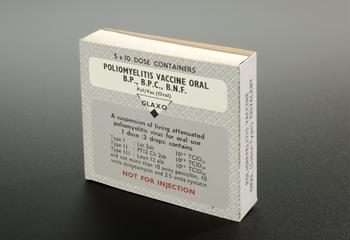
Albert Bruce Sabin Unknown - 1993
Albert Sabin was a medical researcher in the United States who developed the oral vaccine for polio which has become the standard defence against the disease. Working on polio from the 1940s, Sabin observed that some people had immunity even though they had never shown signs of having the disease. Believing they had previously been infected by a weak strain of the virus, Sabin sought out such strains in order to produce a new vaccine.
Sabin’s ‘live’ vaccine caused the body to produce antibodies and so provide long-term immunity against future infection. The vaccine had the added advantage of being taken orally, which meant the weakened virus was rapidly expelled in the faeces of those vaccinated. In areas of poor hygiene and sanitation, the virus could be passed on to others who would in turn be immunised.
Worldwide testing of Sabin's vaccine by the World Health Organization began in 1957. The United States declined this initial testing and Sabin fought hard to convince his home country that his vaccine was an improvement over the existing one developed by Jonas Salk. It was finally endorsed in 1961, but questions of vaccine superiority produced a bitter debate between Salk and Sabin and their respective supporters.
Over time, Sabin’s vaccine came to dominate the public health campaigns that have brought polio toward the verge of global eradication. His oral vaccine has practical advantages over Salk’s injected vaccine: it is cheaper and easier to administer and a single doctor can supervise a team of volunteers, allowing for vaccination on a massive scale - even in remote and inhospitable parts of the world.

